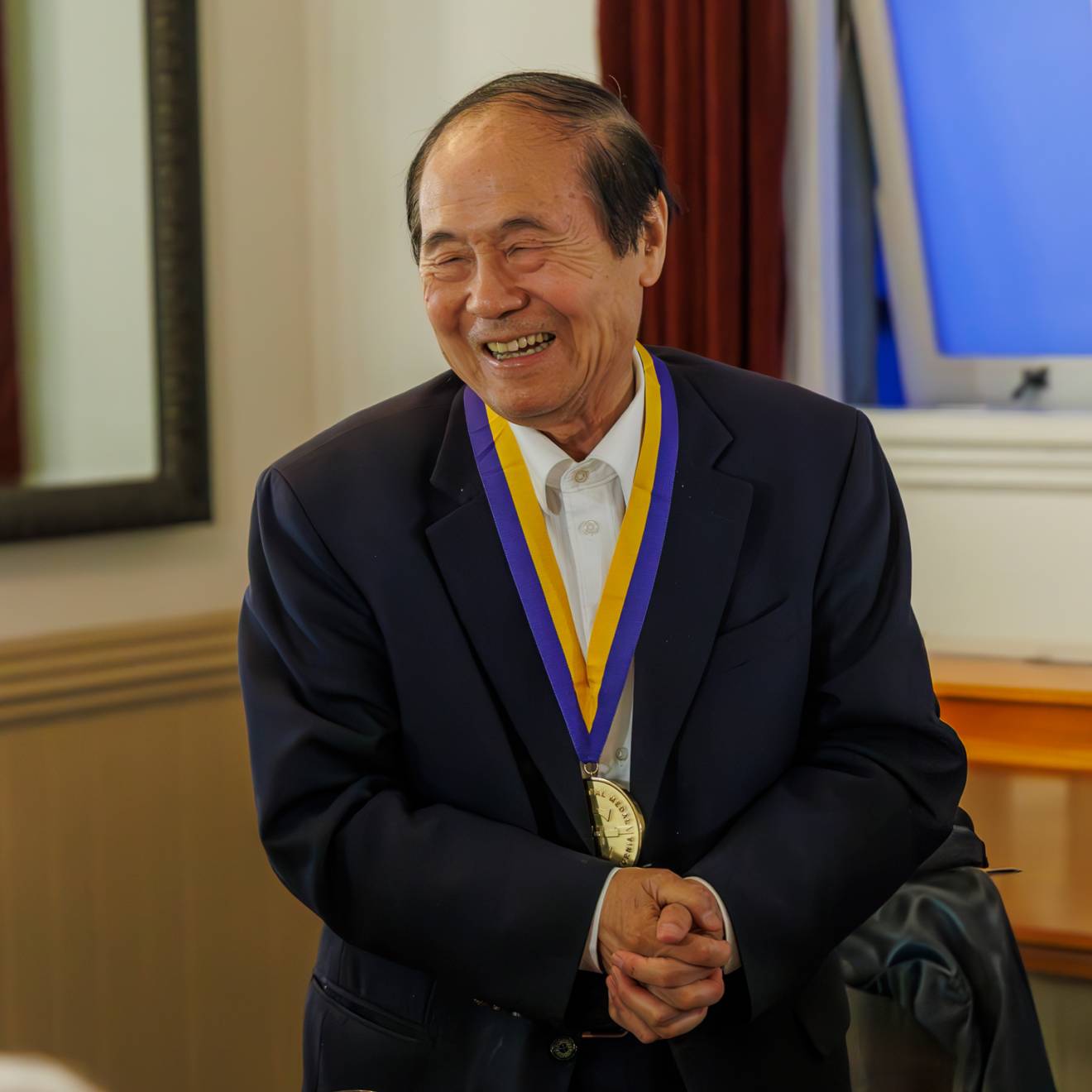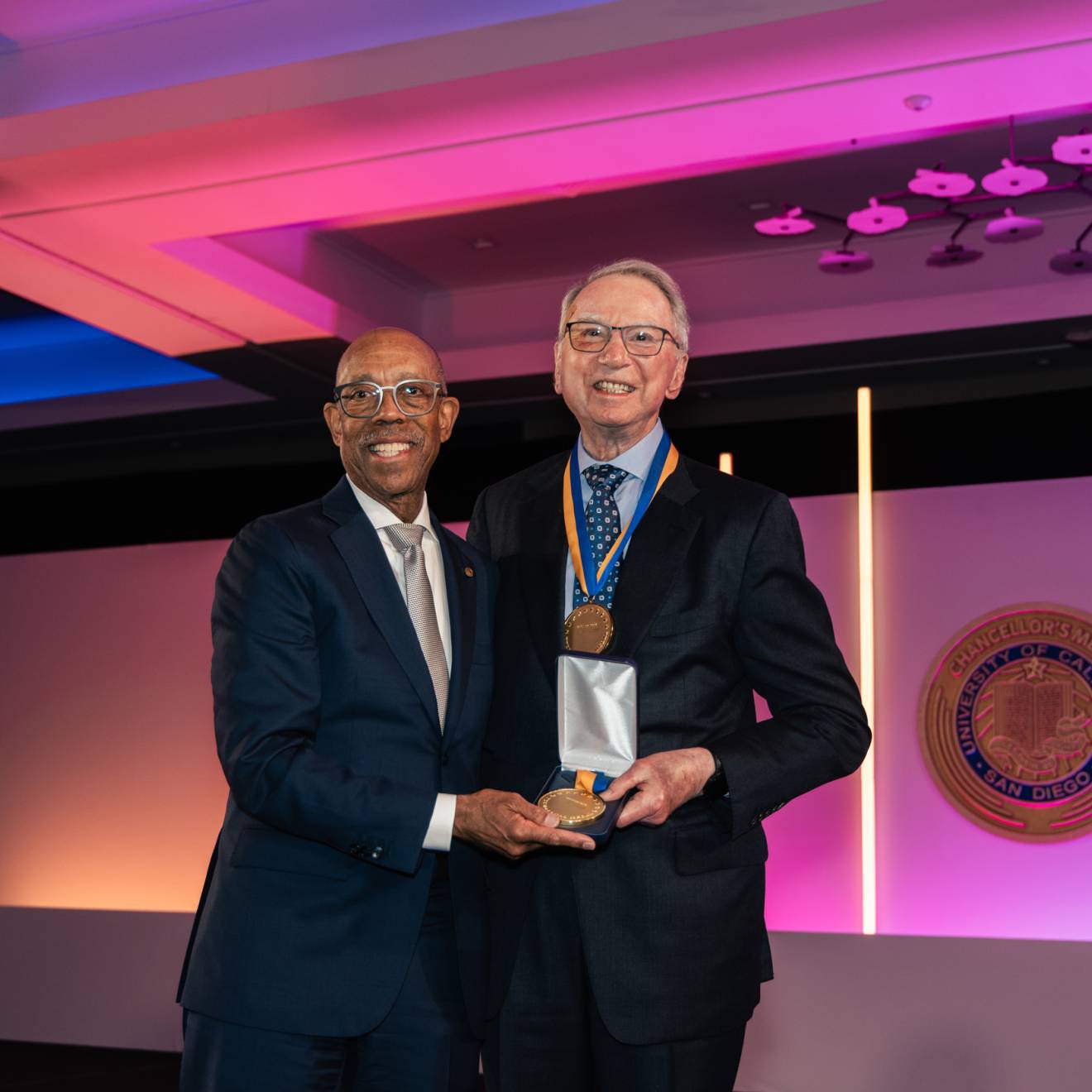Kristen Gross, UC San Diego
Nick Woodman, Muir ’97, entered the Price Center West ballroom to a roaring crowd, flanked by his wife, Jill, and his friends Neil Dana and Justin Wilkenfeld. He met all of them while a student at UC San Diego, and, today, they all double as his colleagues at GoPro — the wildly successful camera company born from his love of surfing.
The energy in the room spiked. With GoPro in hand, Woodman animatedly captured each moment, smiling and cheering along with his fellow UC San Diego alumni here for Alumni Weekend, and current students taking a break from finals to be inspired. There was even an impromptu selfie moment, featuring Woodman and anyone that could fit in frame while the audience waited for the room to calm down, and the program to start.
With a warm welcome by Chancellor Pradeep K. Khosla, and moderating by Associate Vice Chancellor and Chief Alumni Officer Armin Afsahi, the audience was treated to a rousing two-hour chat that came with five hard-learned lessons from Woodman on how to make your own “GoPro” success — no matter what that means to you.
Lesson One: Never give up
Woodman almost didn’t make it to UC San Diego. His application was turned down; instead, he was accepted to UC Berkeley, which was much closer to his home but nowhere near the beach. His love for surfing pushed him to appeal, making a deal with his parents that if he could get into UCSD — known as much for its waves at Black’s Beach as for the high-level education it offers — he could go. “I wrote a very earnest letter of appeal and thank God I got in,” Woodman said. “If I went to Berkeley, I don’t think I would have ended up where I am now — I wouldn’t have had the same interests and inspirations.” Woodman, who received the UC San Diego Outstanding Alumnus Award, went on to say that it was his persistence and not taking ‘no’ for an answer that put him on the trail that he’s blazing today.
Lesson Two: Fail in your 20s
Thanks to his bachelor’s degree in visual arts, Woodman knew what he really wanted to do was be creative for a living. “I thought of myself as an inventor,” he said. “I gave myself to the age of 30 to succeed.” Woodman explained that your 20s — at least for him — are the perfect time to take big risks. Without children in the picture, no mortgage and very little overhead, you’re free to try things you might not try once responsibilities begin to pile up, he said.
Woodman’s first big risk was a social gaming site he called Fun Bug. “Fun Bug was the second time I failed — the first time was my economics class at UC San Diego,” he said, adding that he did take the class again, and passed. “Fun Bug was hugely traumatic, not because I’d failed, but because people believed in me and I let them down.” In 2002, he was unable to make the company profitable when faced with a market crash. Fun Bug was sold for almost nothing, and $4 million of investors’ money was lost in the process. Woodman was 26, with another four years to go on the deadline he had set for himself. “You can fail every year in your 20s and you’re fine — if you can fail and there’s no collateral damage, then just go for it,” he said. “Don’t give up. Lots of these ideas fail, but many don’t.”
Lesson Three: Follow your passion
Feeling gun-shy after the failure of Fun Bug, and with six fruitless months focused on finding his next big idea, he decided to go on a surf trip to Indonesia, Bali and Australia. “It was to surf, yes, but the main reason I wanted to go was to be immersed in my passions and interests because that’s when you’re turned on; that’s when you have a lot of ideas.” Traveling and pursuing our passions forces us to get exposed to new sights and sounds, smell new smells, taste new flavors, he said. Our senses are brought to life and all synapses are firing.
Yet for Woodman, it didn’t work out that way. “It just so happened we were going to be visiting some of the best surf spots in the world at the best time so I wanted to document my experience,” he said. “I knew it might be the only trip like this I ever got to take. So, in preparing for the trip, I started playing around with this concept I had for a wrist camera that would allow me to shoot photographs of my friends while we were surfing. One thing led to another, the prototype was awesome, and the light bulb went off before we even left: I realized, ‘Holy smokes, I think I just had an idea for my next business’ — so the trip turned into an R&D mission to develop the idea. It was the first surf trip that I have ever been excited to come home from.”
Even if your passion isn’t the kind that is easy to turn into a business, pursue it, Woodman said. It might not be the foundation of your career, but being excited and stimulated by your passions leads to the great ideas that could be. “Sometimes our passions lead us to do something where you meet somebody. And that meeting leads to a relationship that leads to an idea that leads to something more,” he said. “Then one morning you wake up and you say, ‘My God, I can trace my happiness and my career all the way back to that one bike ride I took.’ Take the time to pursue your passions in life because, one way or another, they can get you where you want to go.”
Lesson Four: Be yourself
Woodman came to UC San Diego to study business — a pursuit he felt he was ‘supposed to’ go after. After failing his economics course, then persistently trying again with a B- as the result, he realized he just wasn’t interested in it, and that’s what was holding him back. At the same time, he was discovering liberal arts. “I took writing courses, acting classes, visual arts classes, and I loved it. I ended up being the guy that would be up all night on campus constructing some installation art piece and then standing off to the side in the morning to see how people would react to it,” he said. “I realized, if this is what I really love to do, then I should be a visual arts major.” Woodman’s visual arts degree taught him much more than sculpting — it helped him learn how to engage an audience and get people to believe in his vision through a visual medium. “I use my degree every day,” he said.
He also reflected that part of the reason Fun Bug failed was because although he was passionate about the creative process, he wasn’t as passionate about the actual product. By being true to himself, he was able to drive GoPro to the success it knows today: “GoPro is about capturing photos and images of people doing what they love to do — Iwant that, too,” he said.
Woodman's first employees were friends who shared his passion. Afsahi asked the group if they felt they’d changed with GoPro. “We’re a little older, a little slower and we don’t get in the water as much as we once did,” said Wilkenfeld. “But at the heart of it, I think we’ve stayed pretty true to ourselves, and I think because we have each other and support each other we’ve been able to stay grounded.” To that Woodman added, “This is who we are. We don’t change who or how we are because we need to be ‘successful’, or ‘serious’ or ‘professional.’ Be yourself and the world will love you for it.”
Lesson Five: Work hard
“You’re going to miss these days,” is what Nick Woodman and Neil Dana told Jill Woodman. They’d spent a night on the road, with Jill perched on a stool in the front seat of a Penske truck bound for a trade show in Salt Lake City. They shared motel rooms, and stayed up the next night constructing their booth. Just as it was finished, the doors would open and the trade show was starting. “You look around at each other, realize you haven’t slept in two days and you say, ‘Bring it,’” recalls Nick. His advice for anyone starting a business is to find something you’re passionate about because it’s so much time, work and effort that unless you find something you genuinely love, you won’t make it. For Jill, it helped to keep focused on the immediate goals. “It can be overwhelming to think of how much work it’s going to take to get there,” she said. “So just take it one day at a time, marking off those small achievements.” If you bring love to your project, it won’t feel that much like work. “It’s going to be incredibly rewarding and exciting, and it’s going to feel like you’re living the life that you’re meant to live,” said Nick.
As the event came to a close, Through Your Lens video contest winners Kinsey Green, Sixth '16 and Soo Wye, Revelle '17, were called to the stage to accept their GoPro prize packs straight from Woodman. Afsahi then asked Alumni Regent and Trustee Sheldon Engelhorn along with Eric Terrel, a professor at Scripps Institution of Oceanography, to present Woodman with the first and only honorary key to Black’s Beach. Grasping a wooden plaque containing the coveted key and holding it up for the audience to see, an emotional Woodman responded, “I can’t tell you how many hours we dreamed of something like this.”

